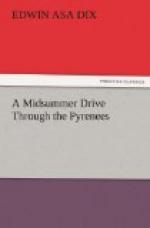This mountain is said to give forth at times a low murmuring sound distinctly audible.
“There is sweet music here that
softer falls
Than petal from blown roses
on the grass,
Or night-dews on still waters between
walls
Of shadowy granite in a gleaming
pass.”
“One of the most impressive features of the scene on the ridge of Venasque on this memorable morning,” so relates one E.S., a traveler of sixty years ago, “was the peculiar, solemn noise emitted from the mountain. The only sound which broke upon our silence while we stood before it without exchanging a word, was an uninterrupted, melancholy mourning, a sort of AEolian, aerial tone, attributable to no visible or ostensible cause.[28] The tradition of the Egyptian statue responding to the first rays of the morning sun came forcibly to my recollection. In her voice, this queen of the Pyrenees ’Prince Memnon’s sister might beseem,’ and superstition if not philosophy might have persuaded some that this sudden glare of brightness and warmth, glistening with increasing intenseness on every ridge and eastern surface, might call forth some corresponding vibrations, and therefore that the plaintive tones we heard were in fact a sort of sympathetic music,—the Maladetta’s morning hymn.”
[28] “Edinburgh New Philosophical Journal, No. XVI; The Peculiar Noises Heard in Mountains.”
Far to the west, over other ranges, the guide points out the glaciers of Mont Perdu and the Vignemale. We are looking off also from this point upon the beginnings of Aragon and of Catalonia; there is nothing smiling about Spain as seen from the Entecade; sterile hills solely heap themselves to the horizon.
We linger on the small knoll, a few feet only in width, which caps the mountain beneath us. Clouds scud over the summits and pass on, and turn by turn we have seen the full view. Finally they come streaming in more resolutely, and eventually defeat the breeze; then we turn downward at last, at a brisk pace, race down the slopes and re-enter France; and warily recrossing the long pasture of the corniculates, hasten on until the hospice appears in sight once more below.
It is far past mid-day now, and we are more than ready for suggestions of alimentation. There is a sheltered table with benches just out of doors before the hospice, and here we seat ourselves, flanked by with two massive dogs, and soon are discussing a nondescript repast which is too late for lunch and too early for dinner but which is remarkably appetizing in either view. An hour later, we are again in Luchon, greeted by the deferential head-waiter of the Richelieu, whose starchy bosom expands with hourly welcome for each who comes or who returns.




